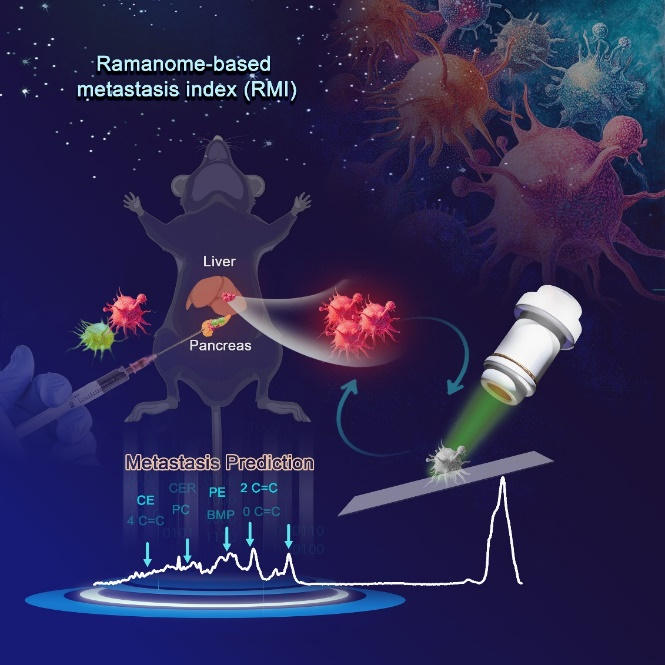Cancer metastasis is a primary factor contributing to the poor prognosis of patients, making the rapid and accurate assessment of tumor metastatic potential an urgent challenge for the medical community. Recently, a research team led by Professor Ren He from Qingdao Medical College, Qingdao University, in collaboration with Professor Xu Jian from the Single Cell Center at the Qingdao Institute of Bioenergy and Bioprocess Technology, Chinese Academy of Sciences, published their findings titled "Label-Free Prediction of Tumor Metastatic Potential via Ramanome" in the journal "Small Methods" (Impact Factor = 10.7). The co-first authors of this study are Zhang Yuxing, a postdoctoral fellow at Qingdao Medical College, Dr. Zhang Yanmei from the Qingdao Institute of Bioenergy and Engineering, Chinese Academy of Sciences, and Dr. Gong Ruining from Qingdao Medical College, Qingdao University. The co-corresponding authors include Professor Ren He, Professor Xu Jian, and Senior Engineer Zheng Xiaoshan. This research was strongly supported by the National Science Foundation for Distinguished Young Scholars, the National Natural Science Foundation of China, the TaiShan Scholars Program of Shandong Province, the Postdoctoral Innovation Talent Program of Shandong Province, and the Shandong Energy Research Institute Project.

Photo by Liu Yang
Raman spectroscopy-based RMI offers a precise evaluation of the metastatic potential of tumors.
Note: RMI is based on various membrane structures and lipids associated with signal transduction, including phosphatidylcholine (PC), phosphatidylethanolamine (PE), cholesteryl ester (CE), ceramide (CER), and bis(monoacylglycerol) phosphate (BMP),etc.
In this study,researchersdeveloped a novel tool for assessing the potential for tumor metastasis, known as the Ramanome-based Metastasis Index (RMI). This index combines machine learning algorithms with the characteristics of label-free, non-destructive, metabolically informative, rapid, and low-cost single-cell Raman spectroscopy. It enables efficient evaluation of the in vivo and in vitro metastatic capabilities of cells across various tumor types. This method addresses the challenges associated with time-consuming and labor-intensive biological experiments, as well as the limitations related to sample availability and the technical proficiency of operators. By replacing traditional biological methods with more objective, stable, and user-friendly physical techniques, RMI provides accurate predictions of tumor metastasis. This advancement offers a new solution for investigating tumor metastasis and the underlying mechanisms involved.
The research team also discovered that lipid-related Raman peaks play a particularly significant role in RMI calculations. Through quantitative lipidomics analysis, the team revealed a significant correlation between the metastatic potential of tumor cells and various membrane structures and lipids associated with signal transduction, including phosphatidylcholine, phosphatidylethanolamine, cholesteryl esters, ceramides, and bis(monoacylglycerol) phosphate, as well as lipid-specific unsaturation.
Therefore, RMI can not only accurately assess and predict the metastatic potential of tumors but also provide a crucial molecular foundation for the in-depth study of the mechanisms underlying tumor metastasis. In the future, RMI is anticipated to play a significant role in tumor diagnosis and the formulation of personalized treatment plans, offering new technical support for the early intervention and treatment of cancer patients.